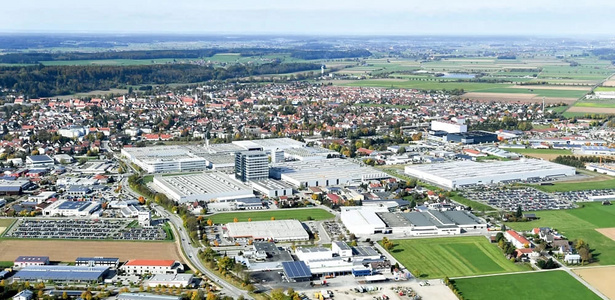On January 24, four weeks after the coronavirus epidemic 2019/2020 in China was discovered and one week before the WHO declared a "global health emergency", GROB already established a Crisis Team and successively brought all German employees that were still in China back to Germany. As a preventive measure to protect the Mindelheim staff from infection, the returnees were given 14 days' leave of absence and did not come to work. From this time, all employees in Mindelheim have received up-to-date information on the virus by postings and the intranet, and have been informed about basic behavior guidelines to protect themselves.
Coronavirus forces implementation of extraordinary measures in Mindelheim
As the corona situation continued to develop very dynamically in Germany and its neighboring countries in Europe in the early weeks of February, GROB's crisis management focused increasingly on our headquarters in Mindelheim. A questionnaire was created for all employees so they could check themselves if they might be part of a corona risk group, and what to do in such a case. GROB's Company Physician Dr. Peter Pawlitzki provided a flowchart to the Management as a decision-making aid on what to do if an employee shows symptoms.
Clear behavior guidelines were defined in a self-assessment questionnaire for customers, suppliers, and visitors wanting to visit the Mindelheim plant. This questionnaire must be filled out and signed. GROB employees now only go on business trips if absolutely necessary – and not to risk areas. "We are doing everything we possibly can to minimize the risk of infection and keep the company clean," says German Wankmiller, Chairman of the Board & CEO. "These measures are also necessary for working as a professional with the automotive industry." Christian Grob, Chairman of the Supervisory Board, adds, "Our goal has always been to allow as little as possible into the plant, which resulted in us having to cancel our In-House Exhibition in March."
As a rapid response, all employees that were on vacation during carnival season received a letter asking them to stay at home if they had a cold or fever, until they knew what the cause was. In addition, we are investigating to what extent employees can work from home with a desktop computer in case they are sent home by the Local Public Health Department.
Economic effects of the coronavirus
Naturally, all these measures and unavoidable developments will have effects on reaching GROB's projected business goals, the extent of which is not foreseeable at this time. "We are trying to counter this effect," explains German Wankmiller. "Business in China has been practically at a standstill for two months, so we are even more active in alternative markets, such as North and South America, and also in Europe, in order to get through the problems in China." Fortunately, GROB is almost completely independent from Chinese suppliers, which could otherwise lead to production stops in GROB plants worldwide in a worst-case scenario.
GROB has planned for pandemics for ten years
As early as in 2009/2010, an H1N1 pandemic–better known as the swine flu–occurred, originating in the U.S. and resulting in over 18,000 deaths globally. Because of this, GROB dealt with the issue of pandemics even ten years ago and created an internal pandemic plan. These plans have now provided good reference points for the composition of the Crisis Team, scope of work, possible measures (home office, video conferences, visitor guidelines, etc.) and the definition of key function in the company, and more. Following Company Physician Dr. Peter Pawlitzki's suggestions, funds were allocated after the swine flu. "We were able to procure and store a substantial amount of protective masks, gloves, disposable suits, disinfectant, and forehead thermometers," explains Dr. Pawlitzki. "We can now make use of some of these items."

